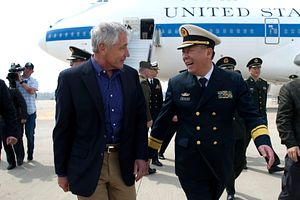One often-heard complaint about China’s military development is its lack of military transparency. During U.S. Defense Secretary Hagel’s recent visit to China, he again raised this issue to his Chinese counterpart. Actually it is misleading to say that China has not made efforts to increase its military transparency (see here and here); it is just that the U.S. side feels like China has not done enough to make itself transparent. Commentators have also debated over why there is a lack of transparency in China’s military buildup. According to Chinese scholars, the reasons why China’s military is not transparent enough include the following: 1) transparency is a result of trust and thus what is more important is to build mutual trust between China and the U.S.; 2) the lack of transparency is a way to protect China against a much stronger rival in the U.S. military and it is unfair to ask the weak side to be equally transparent or even more transparent; 3) being secretive is part of Chinese strategic culture and it cannot change very quickly. The last point is especially interesting because China’s lack of military transparency is not just aimed at foreign countries; China’s domestic public has very limited access to its own military development and many have criticized this.
Although in general more transparency and openness are good when it comes to assessing a country’s strategic intentions, there is also a tendency among commentators to overvalue military transparency. We should keep in mind that increased military transparency does not clearly signal strategic intentions. For example, Russia is arguably more transparent in its military spending and activities than China is, but this didn’t stop Russia from invading Georgia in 2008 and annexing Crimea in 2014. Some might argue that Russia’s military is not transparent enough, but this misses the point. Strategic intentions are key, and intentions can change regardless of how transparent one’s military is.
Pushing China to be more or completely transparent in its military development can be unrealistic and even counterproductive. No country would be completely transparent about its military development, as doing so would reveal its military vulnerabilities and thus pose a threat to its national security. The U.S. is no exception in this. Moreover, with a high level of distrust between the two sides, the U.S. will not be reassured even if China is completely transparent about its military development. Then the Chinese side would complain that no matter what they do the U.S. will not trust them and that the U.S. itself is not transparent enough.
In short, military transparency is unlikely to prevent the U.S. and China from getting into a serious conflict; but strategic restraint or mutually assured restraint from both sides can. The latter should be the main focus of U.S.-China relations.
In a recent position paper released by the Institute for Communitarian Policy Studies at George Washington University in Washington DC, a group of scholars proposed that both China and the U.S. should limit their projection of power in the Western Pacific to reduce mistrust and tension. The key idea is that China as a rising power and the U.S. as a dominant power will not fall into the Thucydides Trap which has been emphasized by both Chinese and American leaders in recent talks (here and here). What is really interesting about this position paper is that it provides a list of issues that require restraint from both sides. For example, it calls for no use of force to change the status quo, including regime change and territorial disputes. It also calls for creative solutions to territorial disputes such as sharing sovereignty. Moreover, it calls for mutual respect for each other’s political and economic systems. The Chinese side seems to welcome this proposal, although it is too early to establish institutionalized mechanisms. However, ultimately whether such ideas will be accepted by both China and the U.S. will be determined by shifting balance of power and domestic politics in both countries.

































